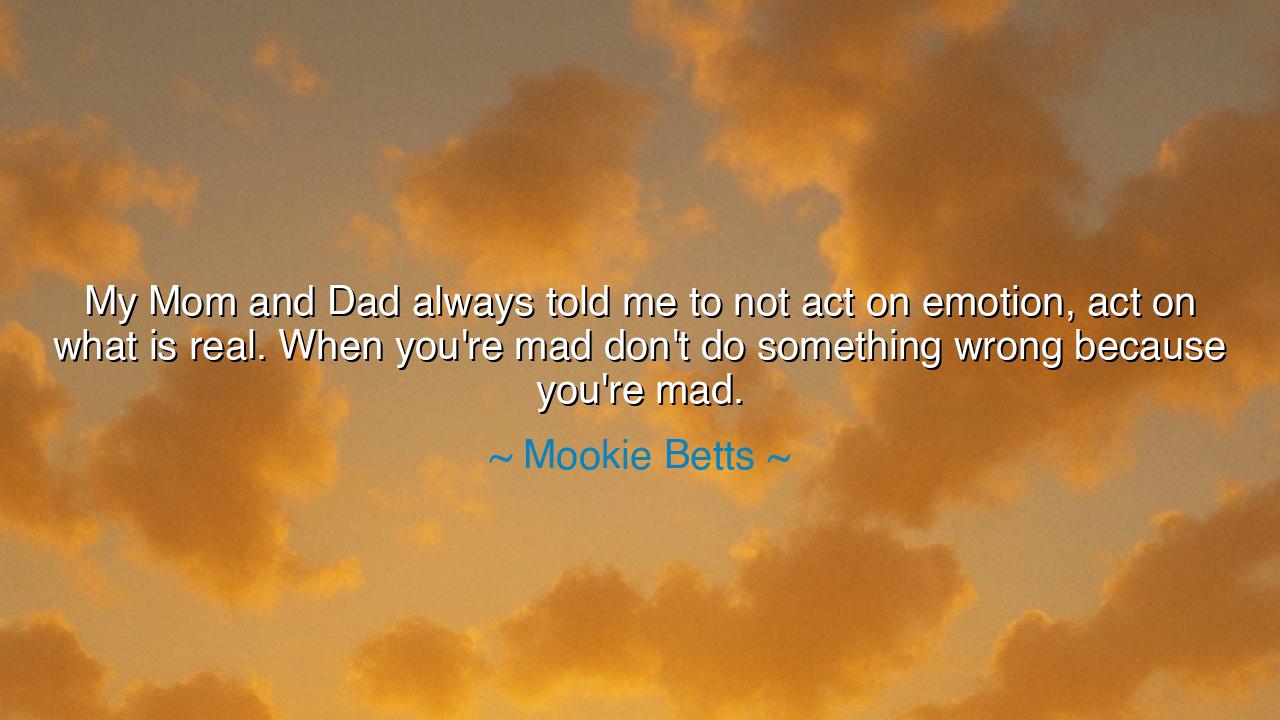
My Mom and Dad always told me to not act on emotion, act on what
My Mom and Dad always told me to not act on emotion, act on what is real. When you're mad don't do something wrong because you're mad.






In the wise and disciplined words of Mookie Betts, we hear the echo of timeless counsel: “My Mom and Dad always told me to not act on emotion, act on what is real. When you’re mad don’t do something wrong because you’re mad.” This saying, though spoken in the language of modern sport, carries the weight of ancient truth. It is the reminder that emotion, though powerful, is a fleeting wind—while reason, grounded in truth, is the anchor of a steady life. To act on anger or pride is to hand the reins of one’s soul to chaos. But to act on what is real—on principle, on wisdom, on patience—is to walk the path of mastery.
The origin of this quote is rooted in the upbringing of Mookie Betts, an athlete known not only for his greatness on the field, but for his composure and integrity beyond it. Born into a family that valued humility and focus, he was taught early that talent may bring one to greatness, but character determines whether one remains there. His parents, in their simple yet profound teaching, imparted a lesson that transcends baseball—it is a law of life itself. In a world quick to anger, their wisdom stands as a shield against self-destruction: act not in rage, but in reality.
The ancients, too, spoke of this virtue. The Stoics of old—Seneca, Epictetus, and Marcus Aurelius—taught that emotion, when ungoverned, is the root of folly. “He who angers you,” wrote Aurelius, “conquers you.” They believed that true strength was not in conquest over others, but in conquest over oneself. The warrior who masters his own temper is mightier than one who commands an army. Betts’ words reflect this same philosophy: his parents, like the sages of Greece and Rome, taught him that the greatest victories are inward.
Consider the story of George Washington during the American Revolution. In the bitter winter at Valley Forge, his soldiers were starving, freezing, and ready to revolt. Anger surrounded him, despair pressed in, and the temptation to lash out in fury was immense. Yet Washington did not yield to passion; he acted on what was real. He sought supplies, he steadied morale, and by reason, not wrath, he led his men through the storm. Had he acted in anger, the rebellion might have collapsed. Instead, his calm became his crown. Such is the power of measured will over uncontrolled emotion.
When Mookie Betts speaks of anger, he speaks of something universal. To act while angry is to act blind. Anger burns hot but leaves ashes; reason burns slow but leaves light. Every person, no matter their path, faces moments where emotion surges like a storm—betrayal, injustice, failure, insult. The fool lets that storm drive him; the wise one waits until it passes, then walks the path revealed beneath. This is not weakness—it is self-command, the highest form of strength. For to master one’s temper is to master destiny itself.
The meaning of Betts’ wisdom is not to deny emotion, but to govern it. Emotion is not evil—it is energy. But that energy must serve truth, not rule over it. When you feel anger, pause. Ask what is real beneath it. Is it fear? Is it pride? Is it love wounded? Then act not from the fire, but from the foundation. When you do this, your choices will be pure, your words steady, your actions just. For truth, unlike emotion, does not vanish when the moment fades.
The lesson, then, is simple and eternal: do not let your feelings become your master. When you are angry, be still; when you are hurt, be thoughtful; when you are tempted, be truthful. Wait until you can see clearly, and then act. Those who live by this rule walk through life as calm waters—deep, reflective, and strong. They make fewer enemies, cause less regret, and build legacies of peace instead of ruin.
So, my listener, remember these words as a guiding torch: when the fire of emotion rises within you, hold fast to what is real. Do not speak too quickly, do not strike too soon. Truth will wait for you; wisdom will not abandon you. In patience, strength is born. And when you act—not from anger, but from clarity—you will discover, as the ancients did, that the truest victory is not over others, but over yourself.






AAdministratorAdministrator
Welcome, honored guests. Please leave a comment, we will respond soon